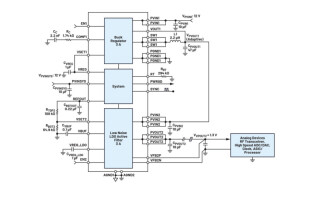Mirroring Real-World Engineering Projects for Student Competitions: Benefits of a Four-Year Model
October 31, 2018
Blog

By replicating a real-world vehicle design, complete with the challenges associated with building a fully functioning hybrid, the EcoCAR competition trains students as budding automotive engineers.
Engineering student competitions bring a wealth of knowledge and expertise to the typical college student’s resume, often putting them in a stronger position to be hired upon graduation. Unlike year-long competitions, four-year competitions provide a deeply immersive experience where students develop vital engineering skills across their entire college track to better prepare them for their careers. One such competition is The EcoCAR Mobility Challenge, the latest U.S. Department of Energy Advanced Vehicle Technology Competition (AVTC) series focused on accelerating the development of emerging automotive technologies related to hybrid and electric vehicles.
By replicating a real-world vehicle design lifecycle, complete with the many challenges associated with building a fully functioning hybrid car, the EcoCAR competition trains students as budding automotive engineers. Over the span of four years, students encounter similar situations as professional engineers, including making design choices, project planning, deadline constraints, and challenges with team turnover.
Teaching Industry Practices Creates Successful Students
Multi-year competitions like EcoCAR Mobility Challenge develops successful students because they mirror an actual industry project lifecycle and gives students ample time to work with and master a variety of design tools. Much in the same way that engineers begin with a design concept that they test and refine, EcoCAR students must handle increasingly complex technology challenges as the competition progresses.
In year one, students are encouraged to focus on the first phase of any typical industry project—the presentation and evaluation of ideas, which helps them generate the design concepts that will define the project in subsequent years. This phase also includes the development of simulation techniques using Model-Based Design, which engineers use to test and prove their designs.
Students and engineers alike use Model-Based Design to simulate their projects and identify technical issues before they begin building a physical prototype. In the first year of the competition, EcoCAR student teams adopt Model-Based Design to help them create algorithms that will determine the form and function of their hybrid vehicle. From there, teams leverage Model-Based Design to ensure their algorithm integrates with system hardware properly, catching any design errors along the way just as an industry professional would. (To learn more on Model-Based Design, download the Managing Model-Based Design eBook.)
Competitors are also exposed to new trends that are rapidly transforming the automotive industry. In parallel to the vehicle development over the course of four years, students explore industry design concepts such as Mobility as a Shared Service (MaaS), where cars are fleet-owned and shared by customers as a form of ride sharing. Automotive industry engineers are actively investigating MaaS and its potential effect on consumer transportation habits. As such, EcoCAR student competitors are challenged to incorporate MaaS design concepts to come up with a new, consumer-friendly in-cabin experience that includes advanced vehicle features. In this way, EcoCAR is pulling students even closer into the real-world design considerations that are shaping the automotive industry—and giving them four years to hone their engineering skills.
By the end of year four, EcoCAR judges expect to see a hybrid crossover vehicle with targeted Level-2 automation features, meaning that the vehicle is capable of limited automation in longitudinal (acceleration, braking) and lateral (steering) control under specific scenarios. The hybrid car must also include V2X (vehicle to everything) technology that not only allows the vehicle to communicate with the environment around it, but also uses the information from the V2X channel to reduce energy consumption. The unique structure of the competition ensures students have the tools to get there. Additional assistance and mentorship from sponsors also ensure students will retain and apply key competition learnings and techniques for sustained success.
The Triple Threat: Combining Academia, Government, and Industry for Sustained Success
The EcoCAR Mobility Challenge sponsors across academia, government, and industry collaborate to build a structure where each year of the competition serves as a stepping stone for the next. This method ensures students steadily grow the skills that they need to ensure success in their professional lives.
The EcoCAR Mobility Challenge is also devised so that a well-rounded team always has a core group of hands-on academic advisors and motivated industry professionals who help drive the direction of the program. For example, sponsors like MathWorks train students over four years by teaching core design principles and introducing the tools needed to complete each phase of the competition.
With this support, students produce the same level of finish and quality as that of a production-ready vehicle. By mirroring industry design challenges, multi-year competitions give students the opportunity to apply what they learn in a way that not only improves the design process, but also ensures they are job-ready upon graduation.




